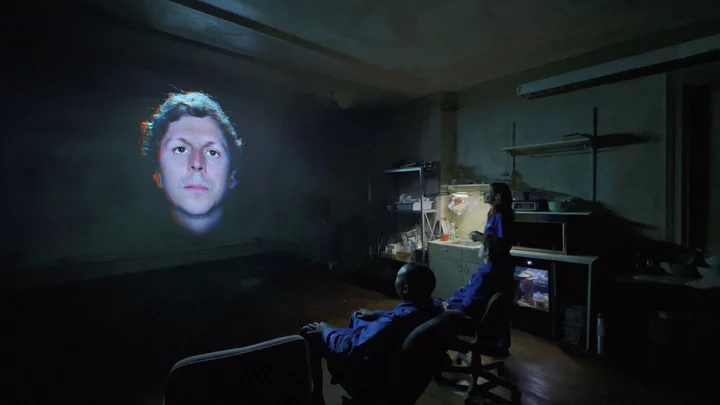If you had "surprise Steven Soderbergh sci-fi series" on your bingo card for Barbenheimer week, you must have one of the time travel devices featured in the director's new release. Dropped without warning on Monday, Command Z is Soderbergh's short series that will inevitably draw Black Mirror comparisons, starring Michael Cera as a digitized trillionaire CEO recruiting a group of employees to reshape the past to save the world from itself.
Released only through Soderbergh's website Extension765, the series is streaming for $7.99 (a fee to be "donated to charity"). It's made up of eight episodes sitting from eight to 20 minutes each, so it's a reasonably quick watch. And reader, it's absolutely worth your eight bucks.
Over its short, succinctly scripted, and superbly acted episodes, Command Z makes the case for the power of changing one person's mind, for the greater good of the planet — that we're not completely doomed if we can convince just a few power players to stop ruining the world. Basically the whole "if you can reach one person" philosophy. As one character says, "We're trying to prove that key small improvements can lead to big improvements in the future." It's an optimistic scenario, and one that distills the work of activists, negotiators, and diplomats into mind control technology operated by three everyday humans, hoping to say the right thing to change an influential mind. One conversation, Soderbergh's series surmises, can change the course of the future.
What is Steven Soderbergh's Command Z about?
Created by Kurt Andersen, Sam Lowry and Larry Doyle, Command Z is inspired by Andersen’s non-fiction book Evil Geniuses: The Unmaking of America: A Recent History. Set in the not-too-distant future, the series hinges around a group of three employees of a once-human, now-AI version of Big Tech CEO Kerning Fealty (Michael Cera). Jamie (JJ Maley), Emma (Chloe Radcliffe), and Sam (Roy Wood, Jr) have been handpicked to work in a dilapidated space known only as The Room. Their mission: "saving the world in tiny increments." How? Time travel and mind control tech.
SEE ALSO: 14 of the best time travel movies you can watch right nowTime travel, in this future, has been made possible through a "quasi permanent entry universe wormhole" linked to the very release date of the series. "We are only able to interact with 2023 because a wormhole is traversable only to its moment of Genesis and then continuing in real time," Kerning explains. "For us, that means July 17 2023."
Accessing the wormhole is done through a terminus portal containing a cosmic string generator — but it merely resembles a regular dryer. Activation requires users to ingest a synthetic, half-mineral, half-botanical, psychedelic substance, while playing the theme song from the movie Mahogany and wearing a Ghostbusters-style helmet.
Fealty directs his employees to help change the minds of high-powered people from 2023 whose selfish actions to secure status and extreme wealth above planetary preservation have led to the doom of Earth, driving climate change, pollution, corruption, and social and financial inequality. It's a concept not dissimilar to Dawn King’s play The Trials, set a few decades from now, in which a jury of young people impose environmental penance upon the generation who ruined the world for them.
In Command Z, there's dodgy fossil fuel magnate Robert Shiner (Mike Houston), a man "personally responsible for 0.3 degrees of global temperature increase," who's about to escape into his own $57 million bunker while the world burns. Or Wall Street giant Kohlberg Pryce (Liev Schreiber), whose abhorrent treatment of employees evokes parallels to what we've seen in Big Tech. Or megachurch "pastorpreneur" and CEO Caddy Winbush (Alexandra Socha), who's using the church's aggressively high tithes and zero tax contributions for political gain.
Jamie, Emma, and Sam need to tap into the inner thoughts of "influencers" around these terrible people, those with the highest probability of encouraging them to change their actions. How? Nanobots! Directly injected with all that free sanitiser distributed during the COVID pandemic. After each mission, the group enjoys a form of report card of how much they "improved" the world by changing a target's mind. With each target, the group has philosophical debates between themselves and with Kerning about the best possible way to influence them: Would their family members change their mind? Their colleagues? Their dog? Sam, Jamie, and Emma also ask poignant, ethical questions, like why not just murder the villains of the past — what would the unintended consequences be?
JJ Maley as Jamie, Roy Wood, Jr . as Sam and Chloe Radcliffe as Emma. Credit: Peter Andrews © 2023 Stage Might IncJamie is an optimist, mourning a breakup but far more upbeat about the crumbling fate of the planet. Emma is the skeptic, challenging Kerning's vague company-speak and throwing nihilism at every turn. Sam is the pragmatist, asking more questions about overtime and company policy than the fact they're about to travel through time using a laundry appliance. Maley, Radcliffe, and Wood Jr. do an impressive job of creating convincing bonds between the three mission controllers, keeping them at a professional distance, but making enough of a team of them to keep you barracking for them.
Soderbergh uses limited budget to maximum effect.
Command Z is not a fancy time travelling sci-fi, showing a burning metropolis of the future with spaceships and opulent terminals. As far as special effects go, the series' time machine is made up of rudimentary, everyday objects. However, with clever cinematography from DOP Peter Andrews and masterful editing by Francesca Kustra, the series makes it pretty easy to suspend your disbelief, boosted by sharp scripts and stories from Doyle and Andersen, along with a seriously impressive collection of writers. Actors and comedians Wood Jr. and Radcliffe lean into their topical late night show roots, as former writers and correspondents for The Daily Show and The Tonight Show, respectively. Episodes are also penned by playwright Jiehae Park (who also stars), YouTuber and former What a Day podcaster Akilah Hughes, and Lean In co-author and Sabrina the Teenage Witch creator Nell Scovell, and New Yorker cartoonist Emily Flake. Essentially, if you're looking for top tier political, social, and economic commentary on how fucked up the world is, this is the bunch.
The majority of the action happens in The Room, the mission control of the time travellers. Feeling more like a theatre set, it's a decrepit, warehouse-like apartment, with a crappy sink and three measly office chairs sitting in front of their all-important screen. Soderbergh doesn't have to include the futuristic scenarios of blockbusters like 2012 or The Day After Tomorrow, as everything happens offstage. The only clues we get as to the state of the world outside the room are the group's hazmat suits, alarms blasting outside, the conversations the group has, and the news reports they tune into on their big screen, suggesting the world is covered in trash, oil spills, and unbreathable air, with irreversible flooding due to sea level rise and something called "DeSantis Day". So, yeah, the real stuff we fear.
And each "mission" is entirely shot through first person perspective and shown on the group's home screen, it's pretty simple and effective.
Michael Cera makes for a superb AI.
An unblinking Zuckerbergian AI who unrelentingly drops Lao-Tzu and William Wordsworth quotes, Michael Cera's Kerning Fealty feels like an amalgamation of the very Big Tech CEOs mentioned in the series. The real Kerning perished en route to Mars, and his sole ambition with his time travel machine is severely self-propelled. In case you missed it, Soderbergh leave you in no doubt of who's being referenced here: Meta CEO Mark Zuckerberg is mentioned by name, while Elon Musk and Jeff Bezos appear in a news photograph.
At times, I forgot Cera wasn't an AI. Credit: Peter Andrews © 2023 Stage Might IncCera amplifies his signature brand of awkward robotica to exceptionally convincing effect, powering Kerning with all the sanitized, forcefully polite personality of a Siri or Alexa. Trying to be the cool AI CEO and not just a regular AI CEO, Kerning spends each episode breaking into phony programmed laughter at suitable moments and trying out new ways to appear on people's screens, each more cringeworthy than the last. At times, I forgot Cera wasn't an AI.
Soderbergh gives you homework at the end of each episode.
One of the funnier elements of Command Z is the watch list Soderbergh leaves you with after every episode, steering the viewer toward extra "research" material for information on the particular topic explored during the episode. Want to know more about time travel? Watch The Terminator, Brother Future, Run Lola Run. About climate change? Soylent Green, The Day After Tomorrow, Ice Age: The Meltdown. About Wall Street? American Psycho, Hustlers, and of course, Wall Street. About God? The Ten Commandments, Oh God! You Devil, Evan Almighty. It's a silly aside, but one that leaves you with Soderbergh's personal list of reference material, how fiction has viewed the various disasters, innovations, and elements of our existence. Go, learn more, the series says, but only through movies.
Beyond this homework, however, ultimately Command Z will leave you thinking about one thing: the power of persuasion. Is it possible to change the minds of those in power? Can small improvements create larger ones in the future? And considering Soderberg's pivotal moment, the precipice of change, the date of essential action, was precisely yesterday, what can we do to make small changes for a better tomorrow? There's no guarantee a high-end dryer and the theme from Mahogany will give us a second chance to save the planet, so we'd better start conversing.
How to watch: Command Z is now streaming through Steven Soderbergh's website for $7.99.









